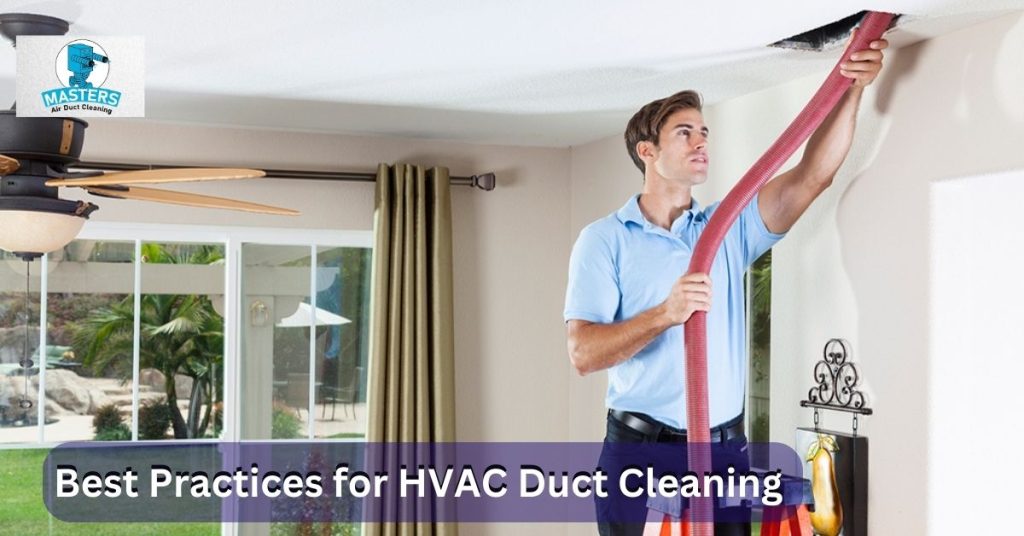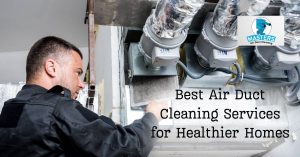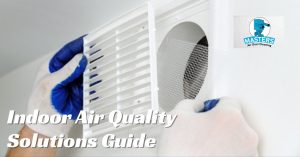Maintaining clean HVAC (Heating, Ventilation, and Air Conditioning) ducts is essential for optimal indoor air quality, energy efficiency, and the longevity of your system. In this guide, we’ll explore the best practices for HVAC duct cleaning.
Why HVAC Duct Cleaning Matters
Improved Air Quality
Clean ducts reduce the circulation of dust, allergens, and pollutants, resulting in healthier indoor air for you and your family.
Energy Efficiency
Clean ducts allow your HVAC system to operate more efficiently, reducing energy consumption and lowering utility bills.
HVAC System Longevity
Regular maintenance, including duct cleaning, can extend the life of your HVAC system, saving you money on costly replacements.
When to Consider HVAC Duct Cleaning
Visible Contaminants
If you see visible contaminants like mold, dust, or debris inside your ducts or around vents, it’s time to consider cleaning.
Unexplained Health Issues
Frequent respiratory problems or allergies in your household members could indicate contaminated ducts.
Post-Construction or Renovation
After significant home construction or renovation projects, ducts may be filled with dust and debris and should be cleaned.
Routine Maintenance
In certain situations, incorporate duct cleaning into your routine HVAC maintenance schedule every 3 to 5 years or more.
Best Practices for HVAC Duct Cleaning
Professional Inspection and Cleaning
Hire a certified HVAC technician for a comprehensive inspection and cleaning of your ducts, ensuring thorough removal of contaminants.
Use of High-Efficiency Particulate Air (HEPA) Filters
Install HEPA filters to capture smaller particles, improving air quality. Regularly change filters to maintain their effectiveness.
Sealing and Insulation Inspection
Check for leaks or gaps in the ductwork and ensure proper insulation to prevent energy loss.
Regular Filter Replacement
Replace standard air filters every 1 to 3 months or as your HVAC manufacturer recommends.
System Efficiency Tune-Up
Schedule regular HVAC system tune-ups to ensure it’s operating at peak efficiency, reducing the need for duct cleaning.
Safe and Eco-Friendly Cleaning
Choose safe and environmentally friendly cleaning methods that are safe for your system and avoid harsh chemicals.
DIY Duct Cleaning
Vent and Register Cleaning
You can clean vents and registers with a vacuum and a brush. Ensure they are free of dust and debris.
Filter Replacement
Replace air filters regularly, following manufacturer recommendations, to maintain air quality and system efficiency.
Conclusion
Regular HVAC duct cleaning is crucial for maintaining clean indoor air, energy efficiency, and the overall health of your HVAC system. Whether you hire professionals or perform some maintenance yourself, these practices will contribute to a more comfortable and efficient home environment.
frequently asked question
- Is duct cleaning necessary if I have high-quality filters installed?
- While filters help, duct cleaning is still required to remove contaminants that may settle in the ducts over time.
- Can I clean ducts myself with household cleaning products?
- It’s not recommended to use household cleaning products in ducts. Professional duct cleaning methods are safer and more effective.
- How can I tell if my ducts have leaks or gaps?
- Look for visible cracks or leaks in the ductwork, and consider hiring a professional technician for a thorough inspection.
- Are there eco-friendly options for duct cleaning?
- Yes, many eco-friendly duct cleaning companies use environmentally safe methods and products.
- What are the benefits of HEPA filters for HVAC systems?
- HEPA filters can capture smaller particles, including allergens and fine dust, improving indoor air quality.


